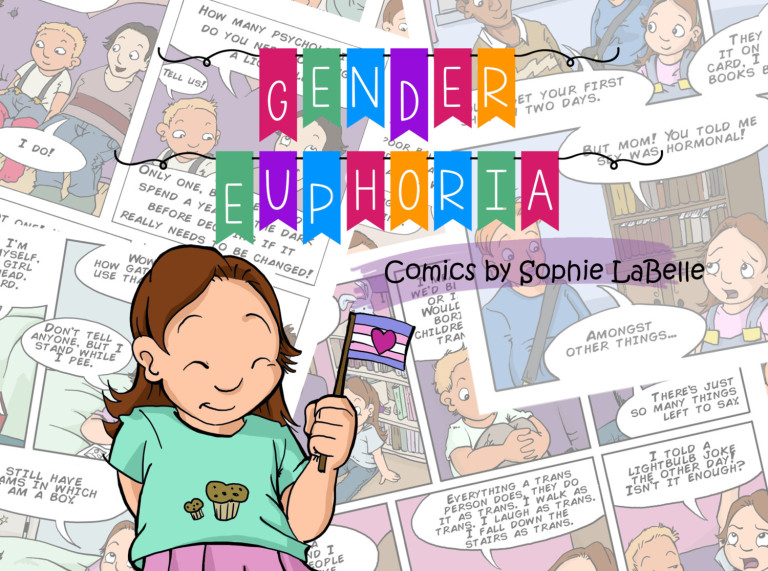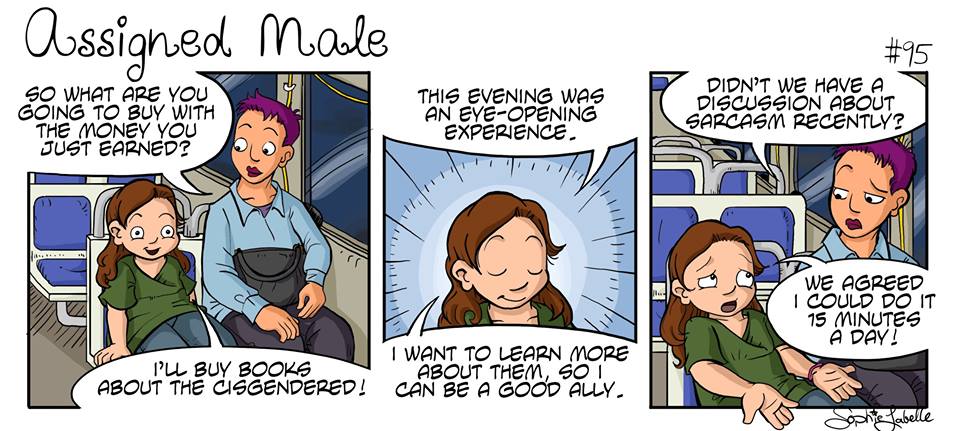There’s so much more to Sophie Labelle than her vibrant pink locks. From inside the walls of her old classroom in Northern Canada, to her cozy Montreal flat, she is not your average girl next door. An elementary school teacher turned trans-author, cartoonist and public speaker, Sophie has become a voice for trans communities around the globe.
She has used her own creation, the internationally acclaimed web comic “Assigned Male” as a panel to propel her message. Ready to take on Iceland for the next month, we caught Sophie in her Chicago homestay, a day before her arrival in Reykjavík.
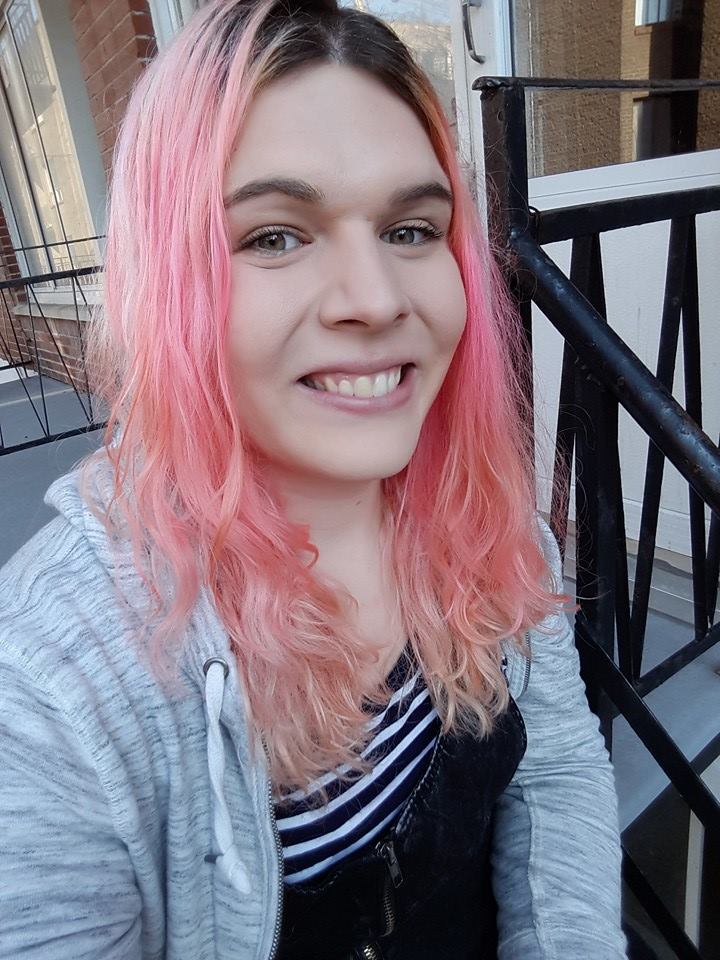
Denique: “It’s so early in your timezone, but I want you to tell us three things that people don’t already know about you!”
Sophie: “Firstly, I’m actually more into sewing than drawing. I’ve wanted to design theatre costumes since I was five, so I learned how to use a sewing machine long before I ever used a drawing tablet. Secondly, my [pink] hair isn’t natural. Thirdly, I love musicals. These days I’m really excited about Mathilda!”
Denique: “I thought the pink was natural! So you started the web comic “Assigned Male” over a year ago. When you wake up in the morning, how do you react to over 40,000 followers on Facebook? Did you ever think it would come to this?”
Sophie: “I still feel like Cinderella right now because before all this, I was simply drawing this comic for fun and suddenly, so many people seemed to relate to it. It’s really amazing. It’s also funny because when I wake up, I usually pick up my phone and ban 20-50 people from my pages as I want to keep those spaces safe, especially for youth. I have a lot of children reading my content, even though some comics discuss hetero/cis-normativity. Those kids are craving to find representation and are willing to read anything that includes a character like them.”
Denique: “That’s so responsible of you.”
Sophie: “Yeah, as an ex-elementary school teacher, that’s something that’s really important for me. Everyday I receive messages from people who share their story with me, and how my comic has helped them come out, so I want to keep the pages clean and free from any harassment.”
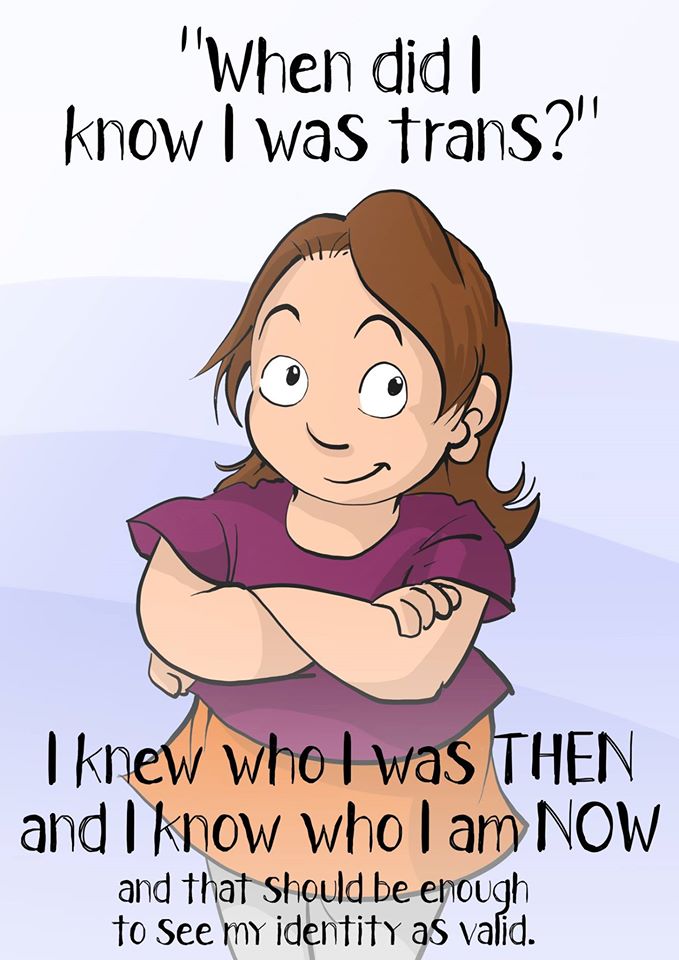
Denique: “What kind of support system did you have when you first began creating art?”
Sophie: “My family always supported my comics, as they are light and the format is easily understood. When I made comics in elementary school, people would pass them around and continued to ask for more. I think in second grade, I was known as the girl who made comics. It was a way for me to gain some self-esteem, especially during a time where I had experts trying to figure out my gender. It was a pretty bad time but my drawings helped me cope with all the stress linked to my transition.”
Denique: “So would you say the characters in “Assigned Male” reflect your own personal experiences being a binary trans woman?”
Sophie: “Not at all. I transitioned quite early in my teenage years and I was raised by my brothers and my grandparents, so it was a very different experience. I think the biggest thing that Stephie (main character) and I have in common, aside from us being white trans girls, is that we’re both outspoken and we “speak like adults”. Trans people often have to educate others on what they’re going through, which is why some people feel that the characters in my comics “speak like adults”. This definitely influenced how I made the characters talk. And we obviously both have a passion for gender studies.” (Laughs)
“ I was known as the girl who made comics. It was a way for me to gain some self-esteem, especially during a time where I had experts trying to figure out my gender.”
Denique: “Unlike what we’re taught from a young age, gender identity isn’t black and white. Do you think we’d ever see the day where gender labels don’t exist?”
Sophie: “That’s a utopia. It would never happen in my lifetime and it would be impossible to grow up without these labels. When we talk about identities, people often say, “Nowadays, there are too many labels that we need to get rid of!” but that’s not how society works at the moment. Especially talking about trans experiences, identities can mean so much to people who feel like it’s the first time they have a label that they can relate to. It’s like finding a word that perfectly describes how you feel in a particular moment; I see youth who thrive behind those identities. Right now, it’s unrealistic to think we could shatter them.”
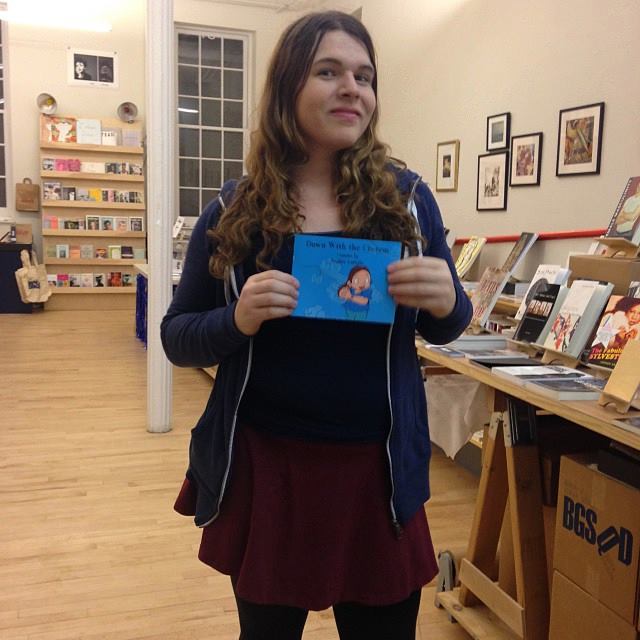
Denique: “Sounds frustrating. What is the biggest misconception about the trans community?”
Sophie: “Well it’s so hard to answer this question because sometimes these “misconceptions” might be true. We’re a part of society so we naturally get influenced by the sexist way that humans view trans people, and so many transgender people become affected by cis-sexism and internalize new ideas and concepts that are being used in society at large. And what we would call a “misconception” could actually apply to some people. One common misunderstanding would be the idea that trans people want to assimilate into the binary and I feel that it hurts a lot of people. It adds a pressure to conform to these stereotypes and it puts a lot of importance on the idea of “passing” as a specific gender. This is really stressful.”
Denique: “You’ve experienced criticism from men’s rights activists, but also TERF (trans exclusionary radical feminists) groups and transphobic cis gay people. If you could meet your critics for coffee, what would you say to them?”
Sophie: “First, they would see that I’m not the monster they’ve been trying to paint me as. (laughs) Anytime I’ve met someone with conflicting views, we got along fine. People think that, because I draw a feminist/trans comic, I want to pick fights online with randoms but I’m truly the last person who would engage in that sort of behavior. These people often try to dehumanize any trans person that has a positive discourse on their body, which is a common struggle for most trans-activists. As soon as we have control over the things that people say about our bodies, we receive negativity. We have forums dedicated to hating us and these people will often try to polarize the debates. The fact is, trans communities are addressing many issues that seem trivial to some people, which is a sign that these issues are important.”
“Society tries to otherise minorities by putting a label on them, without allowing them to label themselves. It’s almost trying to make trans people the opposite of male or female.”
For example, I’ve heard of some horrible things that trans people have done to themselves and their bodies, after being misgendered in public, something society doesn’t consider a “legitimate” violation. When someone is misgendered and speaks up, I’ve heard some men say, “Well, I have long hair and some people call me “miss” from time to time. I don’t care! I act like an adult and move on!” but it’s really not the same thing at all. When you’re misgendered every single hour of every day, it’s not the same as being misgendered once in a blue moon. People use that to invalidate the feelings of trans people who experience violation from society.”
Denique: “Is it harder to receive criticism from your peers in the queer community?”
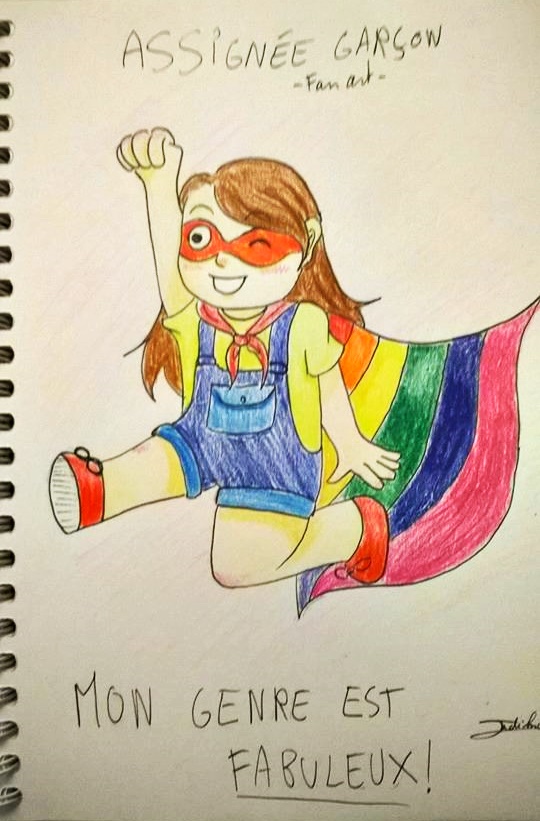
Sophie: “I’ll tell you a secret here; there’s this rule in trans communities, often called the “Morgan M Page rule”, that specifies that trans women will not criticize another trans woman in public. I respect that rule and I don’t pick fights with other trans women or other trans folks as we already have so much bullshit to deal with every day. It’s hard to get criticism from other members of the community because I know what they’re going through, I’m going through it too.
Interestingly enough, the area I feel the most transphobia is often in Montreal’s village. Since we are seen as a part of sexual and gender communities but often left out of the acronym, cis gay people feel entitled to judge the way we do activism in the trans community. This can be damaging as I think there’s an assumption that since we’re both part of a marginalized group, we understand exactly what the others are going through and what they’re dealing with.”
Denique: “The gay community often refers to “pride”, being proud to be gay. Does the word “pride” resonate through the trans community?”
Sophie: “Being proud of our trans-ness is something that’s been developing for decades. I feel that we want to be accepted and to feel like we always have a safe space, but that isn’t happening right now. Society’s discourse on trans-ness always refers to our struggles, how hard we suffer. Well, we can’t just live our lives in the comfort of our own homes; it’s something that needs to be an ongoing push. It seems like it’s a positive thing to go on TV and say you’re proud to be gay, but to say you’re proud to be trans is something that’s unheard of. Navigating this can be really oppressing as people often assume that you can’t be proud of your transness, that you necessarily want to get rid of it. As gay and lesbian activism got institutionalized and stopped challenging heterosexism, I feel that trans-activism is the last chance we’ve got to change the way we all perceive gender, rather than finding ways to include trans people within cissexist structures and paradigms.”
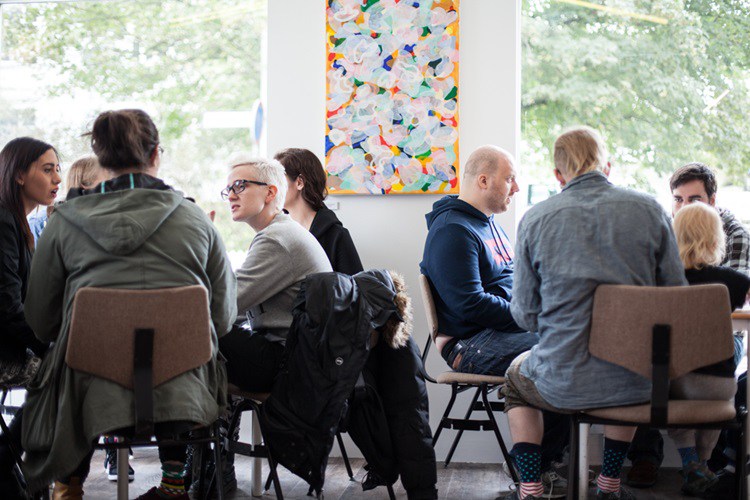
Denique: “You recently posted a comic about Springfield, Illinois’ recent bill to prevent trans and non-conforming students to use regular restrooms. I’m curious to hear your thoughts on this.”
Sophie: “Well I don’t think it should be advertised as a third option because often, we try to put trans people in those washrooms but forget the fact that some want to use binary washrooms. This is something I’m nervous about; instead of destroying the “male” and “female” boxes that our society will often try to add a third box, which doesn’t make sense. Society tries to otherise minorities by putting a label on them, without allowing them to label themselves. It’s almost trying to make trans people the opposite of male or female. When I was in Sweden last year during my European tour, I was amazed at how many gender neutral restrooms I could find. And when I say gender neutral, I mean no gendered restrooms at all. It was simply a room with a bunch of separate stalls, open to anyone regardless of gender. I hope this becomes the norm in North America.”
“I was so surprised that the Icelandic people were even interested in what I am doing. It was such an amazing opportunity that I wanted to experience! I will be giving talks, workshops and possibly doing a book launch in Icelandic.”
Denique: “You know when you’re star gazing and as you stare into space, there’s that very particular sense of quiet discomfort, which stems from the fear of the unknown, having no conclusive answer to what you see… in society, do you feel that there’s a link between that same feeling and the trans community?”
Sophie: “I like the analogy. It’s very recent in human history that we started caring about people’s genitals, relating to their gender identity. Sometimes I feel like I’m in an alternate universe, as I go from community to community, giving talks within feminist and trans-friendly spaces and I’ll get into discussions where I still feel like my words don’t mean anything!”
Denique: “It seems like a huge component of your movement is to educate people and bring awareness to all these issues. But I can’t help but wonder… do you ever feel absolutely exhausted from it all?”
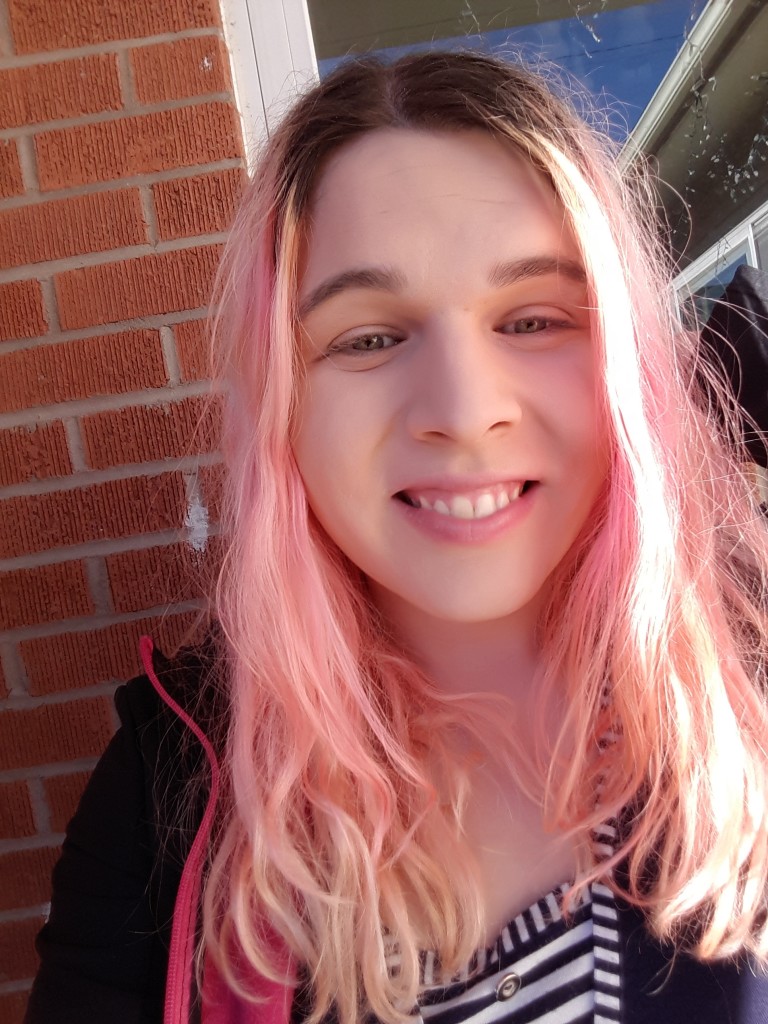
Sophie: (Laughs) “Well I’m not sure. Most times it feels empowering! All the people I meet, all the stories I hear… it gives me so much love. I feel so grateful to be experiencing this. What exhausts me the most is the amount of pressure I put on myself because I really love my job and want to do it for as long as possible. I haven’t spent a single day in the past two years where I haven’t drawn something. I’ve been doing this for almost two years and I’m still my own worst critic. I am struggling to create a barrier between my work and my personal life but I need to work on that myself! All that being said, it’s a very rewarding job.”
Denique: “Proudest moment so far?”
Sophie: “Well, my mom said she was proud of me and that meant the world to me. It’s not something I experienced as a child as I was a very good student, who got good grades, and that sort of became what was expected of me. I would always seek my parents approval, which was hard to get and my mom even suggested that I shouldn’t get into trans-activism, that I could continue making art without “that feminist thing”. Needless to say, my mom telling me she was proud of me was my own proudest moment.”
Denique: “Well we’re very excited that you’re coming to Iceland for a month. How did this opportunity come about and what will you be doing here?”
Sophie: “I’m so excited! I got into a discussion with my friends at Trans Ísland, who started sharing my comics and eventually we decided to collaborate and make something happen. I was so surprised that the Icelandic people were even interested in what I am doing. It was such an amazing opportunity that I wanted to experience! I will be giving talks, workshops and possibly doing a book launch in Icelandic.”
Denique: “Looks like you’ve got an exciting month ahead. If we travel into the future… what’s next for Sophie?”
Sophie: “I want to be a parent.” (Laughs)
Denique: “Think you’d have the time?”
Sophie: “Well, that’s my biggest goal, mostly. I feel very comfortable at this point in my life and I can envision myself as a comic artist for the rest of my life. I feel like being a parent is a next step. And of course, I’d really love to get more content in book stores. I guess I’m sort of internet famous, making web comics, but I’d like to find time to work on a project that’s a little more paper oriented.”


